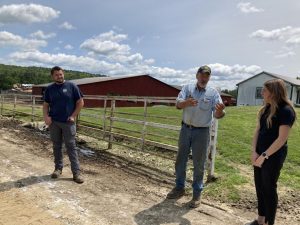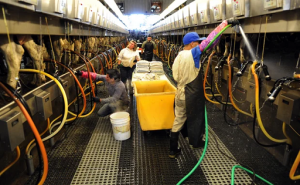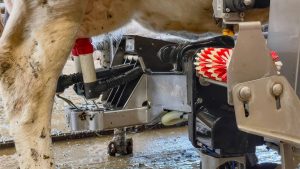
She does this not only to stay in shape, but because she says running serves as a mood booster, impacting both her physical and mental well-being.
“I’ve been doing it for 20 years and it has positively impacted my life,” she says.
Stress comes with owning and operating a dairy farm. Lancaster knows this, but also knows how vital it is to stay in good mental shape as she works alongside her husband, Ryan, to care for their herd of 60 Registered Jerseys on the Tillamook Coast.
“Running keeps me strong physically and mentally,” Lancaster says. “Running gives me the energy to tackle whatever comes my way.”
Head east to Wisconsin and dairy farmer, Carrie Mess, says she began prioritizing sleep which has made a world of difference for her and her mental health. Alongside family, Mess milks 100 cows in Milford, Wis. Known for her Dairy Carrie social presence, Mess says her scaled-back social media presence has also positively impacted her overall mental health.
“People used to ask me how I had time for farming and social media, and I’d joke back that I just didn’t sleep,” she says. “Except it wasn’t really a joke. I was waking up in the middle of the night and if not answering messages and responding to comments, I was thinking about it. Or I was doing things for my other jobs or the farm that I didn’t have time for during the day.”
Mental health practitioner, Ted Mathews, says understanding that sleep deprivation, stress and anxiety are all natural things that go along with being a farmer.
“However, you have to figure out what you can control and learn not to focus on all the things you have no control over,” he says. “When you have corn with too much moisture, you have to wait—and that drives farmers crazy. Well, driving you crazy or not driving you crazy, you have to wait. The more you can understand and accept the things that you have no control over, the better you’ll be able to control things you do have control over.”
Matthews shares that many farmers seek a form of self-medication to ease on-farm stressors. He says that unfortunately, the repercussions from these habits can radiate throughout your family, as well as your operation.
“If I’m really needing to self-medicate, I need to identify that. And the people around me need to identify that too, because that’s not an honest reality. We need to look at mental health a lot more like we look at all other things in our life. Are you a better farmer when you self-medicate? Be aware and be honest with yourself to ask if this is making problems for your family and farm,” Mathews says.
Meanwhile back in Oregon, Lancaster’s form of therapy is found when she puts one foot in front of the other and runs. She plans to continue making running a daily habit that gives her time to think and relieve any stressors that farm and life naturally generate.
“I always feel better after a good sweat,” Lancaster says. “Being outside, fresh air, it’s good for the soul. And it is something I can control. With farming and so many things out of our control, it’s part of my day that allows me to clear my head and relax.”
Mess now strives to get 7 hours of sleep, which she says has made a huge difference.
“I used to be lucky to get 5 hours,” she says. “Usually, it was only 3 or 4.”
Mess shares that getting more sleep has helped both her depression and memory.
Sleep deprivation is a large obstacle for many farmers, especially in both spring and fall. Matthews says it’s easy to cast judgment on yourself for getting too much sleep or not enough, but there is a solution.
“I often ask farmers how many hours of sleep they need each night, and I always say ‘need’. Some say five, some say eight. But when harvest time comes, why do you think that changes? Sure, you still need that initial amount, and if you don’t get it, it’s going to be a lot harder for you to function. The person you’re working alongside, if they require fewer hours of sleep, then you’re obviously going to have a lot more difficulty functioning compared to them,” Matthews told Flory. “Farmers, when they hear that four-letter word, it drives them crazy. You know, if you want to call a farmer lazy, you might as well just slap him upside the head because that’s exactly what it feels like. So, before harvest, you have to build that into your plan; you have to establish what you need, fill in the blank, and go from there.”
In Wisconsin, Mess is feeling more rested and happier, saying that sleep has helped her better manage the stress that life and the farm bring.

























